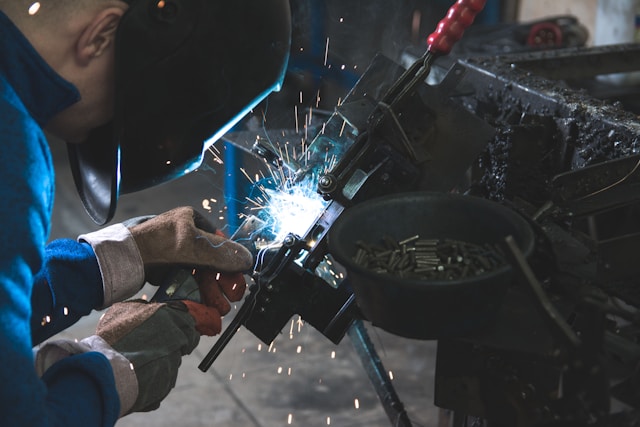
Metalwork are involves the shaping and forming of metal to create objects, from simple tools to intricate sculptures. The art of metalworking has evolved over centuries, incorporating a wide range of techniques that cater to various materials and purposes. As a beginner, understanding the fundamental processes and materials used in metalworking is crucial. This foundation will not only improve your skills but also provide a springboard for more advanced projects.
Essential Metalworking Techniques
When beginning your journey into metalworking, it’s important to familiarize yourself with several key techniques that form the basis of most projects.
- Cutting: One of the first skills to master in metalworking is cutting. Various tools, such as hacksaws, shears, and plasma cutters, are used to cut metal into desired shapes. It’s important to choose the right tool based on the thickness and type of metal you are working with. Practice cutting straight lines and curves to gain confidence and precision in your work.
- Forming: Forming involves bending and shaping metal into specific forms. Techniques like hammering, rolling, and pressing are commonly used. Beginners should start with simple projects, such as creating basic shapes like cylinders or cones, and gradually progress to more complex forms. Understanding the properties of different metals is essential, as some are more malleable than others.
- Joining: Joining techniques, such as welding, soldering, and riveting, are integral to metalworking. Welding involves melting metal pieces together, while soldering uses a filler metal to bind pieces without melting the base metal. Riveting involves using metal fasteners to hold pieces together. Each method has its advantages and is suited to different projects and metals.
- Finishing: Finishing gives metalwork its final appearance and can enhance both its aesthetic and protective qualities. Techniques such as sanding, polishing, and painting are used to remove imperfections and add luster. Anodizing and coating provide additional protection against corrosion. Understanding the finishing process ensures that your metalwork is durable and visually appealing.
Tips for Beginners
For those just starting out in metalworking, having a solid grasp of foundational techniques is crucial for success.
- Safety First: Always prioritize safety when working with metal. Wear protective gear, such as gloves, goggles, and masks, to protect against sharp edges, sparks, and fumes. Ensure your workspace is well-ventilated and free of clutter.
- Start with Soft Metals: As a beginner, it’s advisable to start with softer metals like copper or aluminum alloy. These materials are easier to work with and require less force, making them ideal for honing your skills before moving on to harder metals.
- Invest in Quality Tools: Quality tools make a significant difference in the metalworking process. Invest in reliable and durable tools that suit your projects. Regular maintenance of your tools, such as sharpening blades and cleaning surfaces, will extend their lifespan and ensure precision in your work.
- Practice Patience: Metalworking requires patience and attention to detail. Take the time to plan your projects carefully, measure accurately, and execute each step methodically. Rushing through the process can lead to mistakes and accidents.
- Learn from Mistakes: Mistakes are an inevitable part of learning. View them as opportunities to improve rather than setbacks. Analyze what went wrong and apply this understanding to future projects.
Overcoming Common Challenges
Beginners in metalworking often face challenges such as mastering tool use, understanding metal properties, and achieving desired finishes. Workshops and online tutorials can provide valuable guidance and hands-on experience. Joining a community of metalworkers, whether in person or online, can also provide support and inspiration.
Experimentation is key to overcoming challenges. Trying different techniques and tools will enhance your understanding and help you discover your style and preferences. Over time, your confidence and competence in metalworking will grow, paving the way for more ambitious projects.
Conclusion
Metalworking is a rewarding craft that combines creativity and technical skill. By mastering basic techniques and adhering to practical tips, beginners can develop a strong foundation in metalworking. Whether creating functional items or artistic pieces, the journey of metalwork mastery is filled with opportunities for learning and growth. Embrace each challenge with patience and enthusiasm, and your skills will flourish over time




